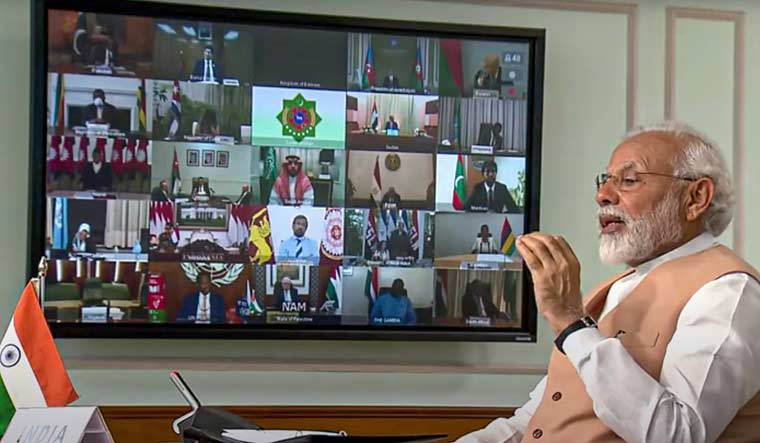India’s COVID diplomacy continues. Prime Minister Narendra Modi on Monday, in a departure from his earlier position, attended his first Non Aligned Movement summit, albeit virtually.
“At this time, NAM can help promote global solidarity. NAM has often been the world’s moral voice. To retain this role, NAM must remain inclusive,’’ Modi said.
Manmohan Singh was the last prime minister to have attended NAM meeting in Tehran in 2012. Modi had become the first prime minister to skip a NAM summit in 2016, sending a signal that India’s priorities where shifting.
The COVID-19 crisis had exposed the limitations of the existing international system, Modi said. “In the post COVID world, we need a new template of globalisation based on fairness, equality and humanity,’’ he said.
"We need to promote human welfare, and not focus on economic growth alone," Modi said, unconsciously echoing the man he wants everyone to forget.
Jawaharlal Nehru’s ghost loomed large in his speech. Modi may have chosen to make the first prime minister India’s enemy number one, but it was hard for him not to use his ideas of a more just world, especially at the NAM summit.
“In the founding spirit of the movement let us aim to come together, not grow apart. Each of us can be safe from the pandemic only if we all are,’’ he said. Another leaf out of the Nehru’s book.
The prime minister also talked about India’s efforts to fight the COVID-19 crisis. “During this crisis, we have shown how democracy, discipline and decisiveness can come together to create a genuine people’s movement,’’ he said. Highlighting India’s outreach, Modi said: “Despite our own needs, we have ensured medical supplies to over 123 partner countries, including 59 members of NAM.”
The summit also provided Modi a chance to take a dig at Pakistan. Pakistani President Arif Alvi had chosen to name India and bring up Kashmir. While Modi did not name Pakistan, his message was clear. “Even as the world fights COVID 19, some people are busy spreading other deadly viruses. Such as terrorism. Such as fake news, and doctored videos to divide communities and countries. But today, I want to focus only on the positives.’’
China, too came up—obliquely. “Many countries organise military drills. But India has taken the initiative to organise disaster management drills in our region and beyond,’’ he said.
Once the central pillar of India’s foreign policy, NAM has over the years lost its sheen. Modi’s decision to downgrade its importance was, however, not as much as to India’s move to be a more active player in multi-alignment. But because it was the central plank of a Nehru’s vision.
Strangely enough, Nehru’s vision—whether it was regional cooperation or NAM—has come handy in this period. While India did not boycott NAM, the prime minister's presence had been replaced by the vice president in the last two conferences.
Also read
- ‘Stone pelting, beheading of soldiers would have continued if Cong was in power: Modi
- ‘Everyone will regret it…’: PM Modi accuses opposition of spreading lies on electoral bonds
- What the fish! Tejashwi Yadav's meal on helicopter snowballs into major political controversy
- Congress’s poll manifesto bears ‘imprint of Muslim League’, says PM Modi



